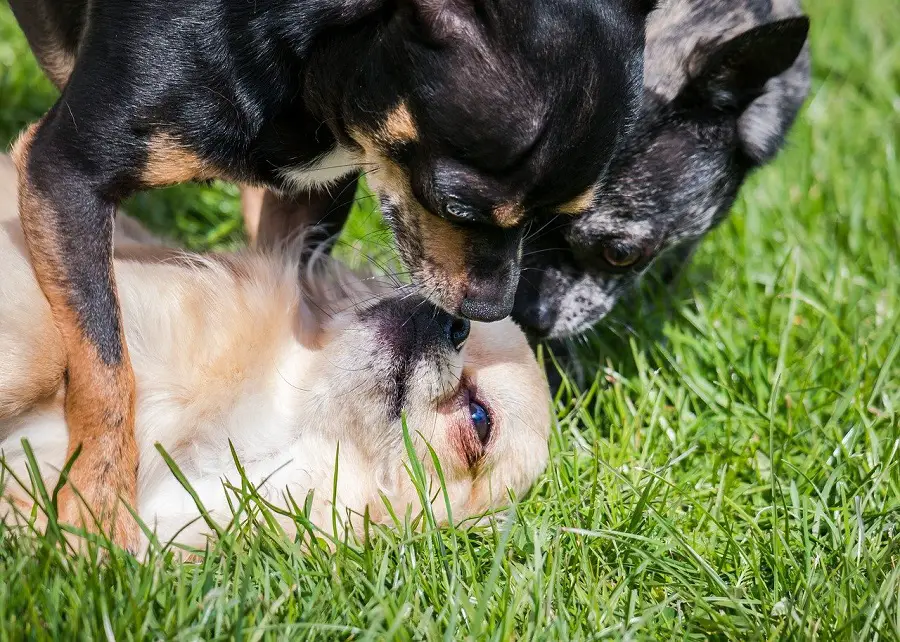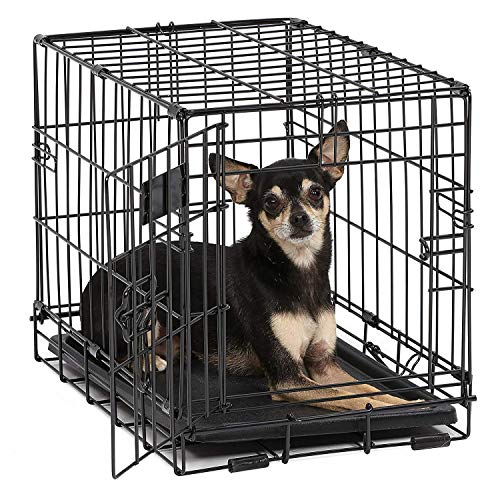Why are Chihuahuas so aggressive? Many pet parents want a solution for their Chi’s extreme aggression towards other dogs, pets, and even humans.
It is a fact that many Chihuahua families have to deal with an aggressive Chi because these dogs are simply notorious for being yappy and aggressive.
In most cases, this trait of aggression can be attributed to genes, hormones, and mostly to improper training.
In this guide, we will discuss:
- What is aggression in Chihuahuas?
- Why are Chihuahuas so aggressive? – Factors that can influence aggression in your Chi.
- Tips to train and socialize your puppy to reduce aggression as well as ways to modify your Chi’s behavior.
- We will also cover ways to manage your environment to reduce aggression in your Chi
- And when to seek professional help.
What is Aggression in Dogs?

Aggression is the behavior or behavioral pattern that a dog uses to resolve conflicts, due to a threat or challenge.
Your Chihuahua uses aggression as a means of ‘survival of the fittest’ and to gain control over resources or over personal space.
It is very important that, as an owner, you understand that aggression in your Chi does not mean that your dog is wicked or mean.
Therefore, it is very important to approach your aggressive Chi with the same amount of love as you’d with other dogs.
Signs of Aggression in Chihuahuas
- Barking and growling
- Baring teeth
- Snapping and biting
- Lunging forward and charging
- Snarling
- Quick nips and bites to cause tearing of the skin
Also Read: Are Chihuahua Easy to Train
Why Are Chihuahuas So Aggressive? 5 Factors That Can Influence Aggression in Chis
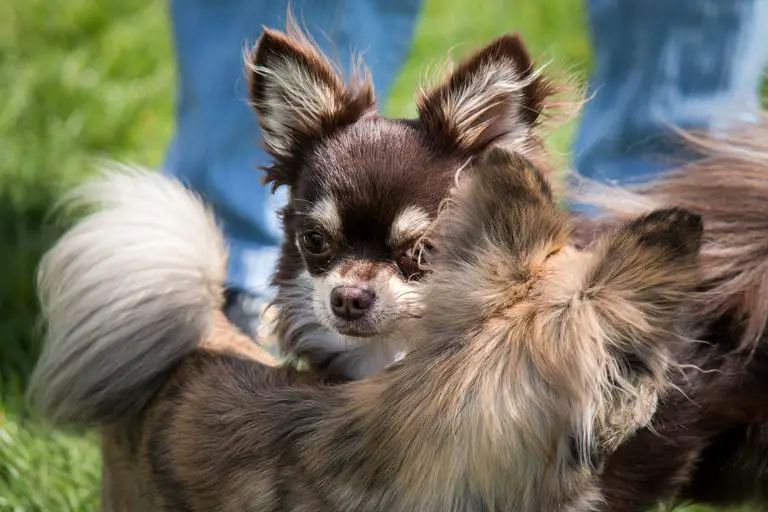
The following factors can lead to aggression in Chihuahuas:
1. Learned behavior
Your Chihuahua uses ‘behavior as an experiment’.
This means that s/he will do something, get certain results, understand the information it gains through that experiment, and then base all of its future behavior on the same results of that experiment.
For example, when your Chihuahua barks every single day at the mail man, the mail man, irrespective of your pet’s barking, delivers the mail and leaves.
To your Chi, his departure is a result of its barking: ‘I barked, and hence the mail man left’. This paves way for all future barking and aggression towards strangers.
Similarly, on your walks, your Chihuahua might approach other dogs and people in a friendly way.
However, you may not want the same, and may have tugged on your pet’s collar or choke chain. This can inadvertently make your dog defensive at the sight of other dogs or people.
2. Genetics
Chihuahuas have only become fashionable as lap dogs in recent times.
However, their original purpose was that of sacrificial dogs. In fact, the Aztecs and Mayans might have even eaten them.
Later on, the breed was specifically developed to hunt and trap small animals or herd cattle like sheep and cows.
All these genetic traits can also contribute to aggression.
For example, your Chi might like to stalk, chase, bite, and hold smaller animals and even kids. This behavior stems from genetics and breed history
These herding and prey tendencies also tend to make Chihuahuas reserved and not-too-friendly towards strangers – which can be perceived as aggression.
It is very important as a Chi parent that you understand and note this history. This can help you get an insight into your pet’s behavior.
However, you must not use your pet’s genetics as an excuse to not put in work to solve its aggression and behavior issues.
3. Hormones
Hormones play a significant role in your pet’s aggression.
Testosterone in male dogs can act as a behavior modulator and make reactions more intense.
Similarly, intact female dogs that come in heat are impacted by changes in estrogen and progesterone levels and begin to display nasty fights.
This type of aggression can significantly reduce after spaying or neutering procedures.
It is also very important that breeders not mate Chihuahuas that tend to show aggression because it is irresponsible and tends to place generations of animals at risk.
4. Social development period
Your Chihuahua also needs proper socialization at the right time.
If you have isolated your pet and not exposed it to a wide variety of experiences during critical social periods behavioral problems like aggression can occur.
5. Stress and fear
Your Chi will also be aggressive if it is kept in a stressful environment.
Typically, stress and fear is seen in pets that are rescued or have had to compete for food and resources all their lives.
Perceived competition from other dogs can also cause stress in your Chi.
Also, aggression is also common in dogs that are afraid of thunder, car rides, etc.
Main Types of Aggression in Chihuahuas
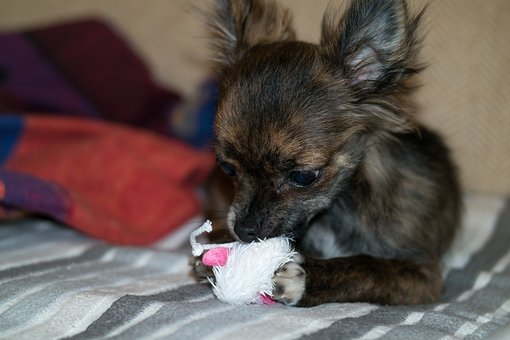
Your Chihuahua might show several different types of aggression. An understanding of these can help you find a solution.
A. Territorial
Your Chi will show this type aggression towards strangers and other dogs that enter or walk past your premises.
To an extent, this aggression may be useful for homeowners.
B. Loyal/protective/possessiveness
Your pet might even show this type of aggression when its beloved humans are threatened.
C. Pain or Illness related aggression
If a Chihuahua is sick or in pain, this can manifest as growling, baring of teeth, biting, snapping, and other forms of irritable aggression.
D. Protective aggression/maternal aggression
New mothers can show this aggression towards people or other dogs that approach their new pups.
Thankfully, this type of aggression does not last for long.
E. Predatory aggression
Many Chihuahuas have a solid predatory drive that can lead to forceful conduct.
This predatory drive can kick in and cause your pooch to see other dogs, hares, kittens, and even young kids as nourishment.
Now that you know the different types of aggressions and have understood ‘why are Chihuahuas so aggressive?’ we will now proceed to the steps of dealing with aggression.
Also Read: Why Are Chihuahuas So Angry
10 Easy Ways to Prevent Aggression in Your Chihuahua

Some of the tips below are directed towards owners of puppy Chihuahuas.
However, you can extend the same training to adult Chis as well.
Remember: younger Chihuahuas are easier to train and you must start early to curb aggression in adulthood.
1. Avoid bringing very young puppy home
It is best to let your puppy Chi spend at least 8 weeks with its littermates and dam.
The dam or mother can teach many important manners to your potential pet.
This includes bite inhibition, social confidence around other dogs, learning to take breaks and calming down.
That is also the reason why you must purchase your Chihuahua from a responsible breeder.
Good breeders will not let their pups leave their litters before they are at least 8 weeks old.
2. Socialize your Puppy
Once your pet is home, the best way to have it socialize with other dogs is to enroll it in puppy school.
Your Chi will meet many dogs of its age there and learn to control dog-to-dog aggression as well as dominance.
It will learn to greet other dogs in a friendly way and even play with other dogs without showing aggression, control, or dominance.
Here is a tentative socialization schedule to follow in your Chi’s first 20 weeks of life:
- Weeks 3 to 8 – dog-to-dog interaction. (Litter mates, puppy classes, dog parks, etc.)
- Weeks 5 to 12 – learn to interact with humans (Invite friends, let your dog greet your extended family)
- Weeks 10-20 – get novel experiences in different environments. (Take your pet on short trips to the mall, etc.)
3. Crate train your pet
Crate training is not only useful for housetraining your puppy, it will also help you establish who the ‘alpha’ or pack leader is in your house.
For example, if your Chihuahua thinks it is the alpha, then it will always show aggression at meal times, or will want to sleep on your bed and couch.
Through crate training, you can discipline your puppy from a young age and establish important house rules regarding food dominance. Most importantly, you will establish a place for your pet to sleep.
Crate training can also prevent begging for table scraps, house soiling, territory marking, and other unwanted behaviors in dogs.
Invest in a high-quality crate of the right size for your Chi. We recommend the MidWest Homes iCrate for Small Dogs.
4. Leash train your Chi
It is also a good idea to begin leash training once your pet is about 4- 6 months of age.
Take your pet on walks on a leash.
Train your pet not to pull on the leash but walk along your side calmly. When it behaves in the right way, reward and praise it for good behavior. You can also teach your pet to heel.
This form of training requires time and patience- so, be consistent.
It is a good idea to take your Chi to the dog park on leash. Here, your pet can meet and greet old and young dogs in an appropriate manner.
Always supervise these interactions. This will help you intervene in case things get overheated as they will when two male dogs or two female dogs come face to face.
Invest in a good collar and leash set . You can also use a Chihuahua harness.
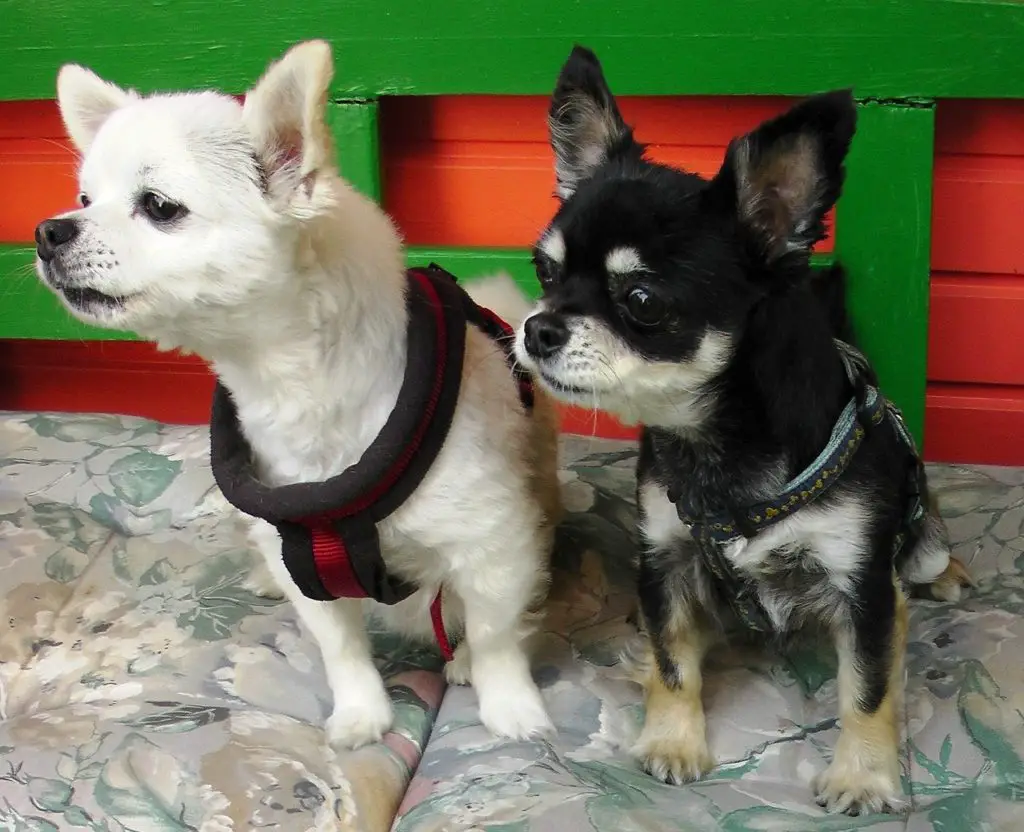
Don’t forget to check out our guides on The Best Collar for Chihuahua and the Best Harness for Chihuahua for more options.
5. Use humane bark collars
One of the main signs of aggression in Chihuahuas is excess barking, growling, and whining.
To curb these behaviors, you can make use of humane bark collars – especially at night time.
Worry not, they won’t hurt your Chi and are a completely safe and humane way of preventing excess barking, territorial aggression, etc.
We recommend the MASBRILL Small Dog Bark Collar which beeps/vibrates every time your dog barks too much. This helps your Chi learn bark control and also teaches it controlled barking.
We also recommend the use of No products found. . These spray citronella or lemon sprays which Chis dislike. Every time your pet barks, the whiff of citronella prevents further barking.
Do check out our guide on Best Bark Collar for Chihuahua where we have discussed many options in humane bark collars as well as tips to prevent excess barking in Chihuahuas.
6. Spay or neuter your pet
As stated above, hormones can also enhance dog aggression and it is a known fact that intact male and female dogs are usually more aggressive than spayed/neutered ones.
Speak to your vet and get your pet fixed at the right time.
7. Provide plenty of mental and physical stimuli to your chi
You must make it a point to tire your Chihuahua out. After all, a tired dog is a calmer dog as it won’t have too much energy left for aggression.
Take your Chi out on walks every day.
Keep each walk short – about 15-20 minutes at a time. Divide this over 2-3 sessions per day – once in the morning, one in the late afternoon, and a final one just before bed time.
You can also encourage your kids to play with your pet. If your dog shows aggression during playtime, ignore it and place it in its crate.
Reward your pet when it is calmer. This will help him understand that only calm play gets rewards.
You can also provide some toys to your Chihuahua – Kong toys , dental chews , and chew toys are best as they keep your pet occupied and prevent food/resource aggression.
8. Manage your pet’s environment and reduce stress
It is very important to prevent stress in your aggressive Chihuahua.
Avoid creating fear and teach your kids to give your pet the space it needs and the respect it deserves.
Never take away your pet’s food while it is eating. Similarly, avoid taking your pet’s toy away as it would cause it to become aggressive and defensive.
If external noises stress your pet out, reduce them by closing the doors and windows or using sound-absorbing curtains and blinds.
You can also use invest in No products found. to keep your Chi calmer during thunderstorms or fireworks.
9. Feed it calming treats
Calming hemp treats can prevent fear-driven aggression in your Chihuahua and many vets recommend them for preventing excess barking, growling, during fireworks and thunderstorms.
Speak to your vet if hemp treats are right for your pet.
10. Seek professional help
If, despite the best of your efforts in early socializing and training, your Chi continues to remain aggressive, then do seek professional help.
Sometimes, it could be pain or illness related aggression.
In addition, you can speak to experienced dog handlers and trainers to guide you.
You must definitely consider professional help if you have an aggressive adult Chihuahua. After all, training an older dog is always more challenging than training a puppy.
Also Read: How to Tame an Aggressive Chihuahua
FAQs on Why Are Chihuahuas So Aggressive?
1. Why are Chihuahuas so vicious?
Small dogs like Chihuahuas often suffer from the ‘Small Dog Syndrome’. They are vicious and aggressive towards other dogs and humans because of their small statures.
This aggression usually stems out of fear and the evolutionary ‘survival of the fittest’ trait. You Chi wants the world to know that it is strong and hence may resort to yapping, growling, baring teeth, etc.
2. Are Chihuahuas more aggressive than Pit Bulls?
In a study by Dognition, it is stated that Pit Bulls are not as aggressive as Chihuahuas.
In fact, the same study rated Pit Bulls 35th in the list of most aggressive dog breeds while Chihuahuas were significantly higher up in the list.
3. Why do Chis bite their owners?
Many Chis won’t hesitate to bite their owners, especially if their needs aren’t met or when they feel threatened.
This is an evolutionary trait as well as a defense mechanism. Untrained and un-socialized Chis are also most likely to resort to growling and biting their owners.
4. Why has my Chi suddenly turned on me?
Many factors can cause an otherwise calm dog to suddenly become aggressive. In unsprayed/unfixed dogs, hormones can cause aggression.
Small dogs like Chis also use biting or barking as a defense mechanism. Most often, this behavior stems from fear or stress.
Speak to your vet to rule out health issues since pain and illness can cause sudden aggression too.
5. At what age will my Puppy Chihuahua calm down?
Chis mature earlier than most dog breeds. Therefore, you can expect your young puppy to calm down by the age of 8-12 months.
If you get your dog fixed at or before the age of 6 months, it would be calmer since its body won’t produce the hormones that are responsible for aggression and dominance.
Final Thoughts on Why Are Chihuahuas So Aggressive?
Why are Chihuahuas so aggressive?
The answer could be inadequate socialization, genes, hormones, and fear. Chis can also become aggressive because of competition, stress, or illness.
We hope this brief guide helps you understand the reasons behind your Chi’s aggression and also come up with ways to have a calmer dog on hand.
